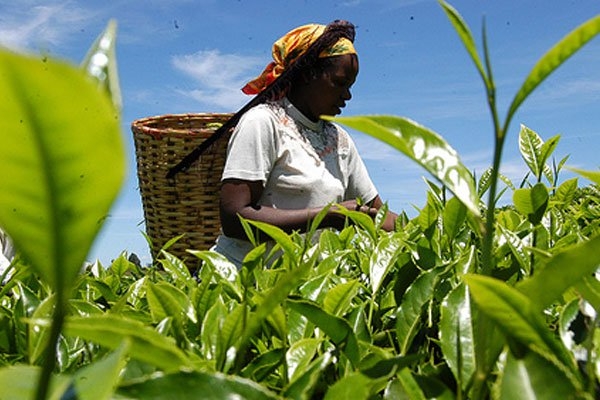Agriculture
FG Distributes Farm Input to 600 Women, Youth Farmers in Plateau

By Joseph Amah, Abuja
The federal government says it will continue to support communities to achieve sustainable food security and save the nation from the impending global food crisis.
Executive Secretary, National Agricultural Land Development Authority (NALDA), Prince Paul Ikonne stated this when the agency distributed farm inputs to over 600 women and youth farmers in Shendam Local Government Area of Plateau State.
Part of NALDA’s intervention in the communities include the cultivation of over 200 hectares of maize farm for the 2022 wet season, the construction of Goat pens, a veterinary clinic and five solar powered boreholes for dry season irrigation farming and to serve as a source of water supply for the communities.
Prince Paul Ikonne explained that the initiative is part of President Muhammadu Buhari’s efforts to ensure that no matter the level of food crisis that may arise from the effect of the Russia/Ukraine war, Nigeria would have enough food for her citizens.
According to him, NALDA is encouraging farmers with the support of the Central Bank of Nigeria to aggressively produce food by meeting them at their point of need in their localities.
“You can see the excitement on them, this being the first time they’re having Federal presence of any kind, this shows how committed Mr. President is in reaching the unreached using Agriculture,” he said.
“It also shows how committed Mr. President is in achieving food security and engaging our youth.
“What NALDA is doing at this time is to encourage farmers and individuals to aggressively go into farming in order to achieve food security considering the situation the world would be going into as a result of the Russia/Ukraine war.
“So these steps we’re taking is to ensure that Nigeria those not experience any form of food shortage or go cap-in-hand looking for food.”
Ikonne noted that after the wet season harvest there are plans for NALDA to cultivate Wheat in the state.
While addressing the beneficiaries from the eight communities, the NALDA boss said the gesture is to ensure the communities enjoy less stressful ways of farming, engage the youths of the community productively thereby reducing crimes in the community and the society at large.
He assured them of NALDA’s continous support all through the farming process through extension services to ensure maximum yields.
Prince Ikonne further assured the beneficiaries of Market availability as NALDA would be off taking from them during harvest.
The traditional ruler of the communities, Kanankur Sule Longvel while receiving the inputs on behalf of the communities commended NALDA for being the first to bring such an intervention to them.
While assuring the Executive Secretary that the inputs would be fully utilized, the traditional ruler appealed for the construction of access roads to the farms and tractors to be made available to enable them engage in mechanised Agriculture.
The total land donated by the communities for the project is 618 hectares but for the first phase 200 hectares would be cultivated with a targeted yield of 1000 metric tons.
In addition to the input distribution, is being built by NALDA at a central location for the communities.
A beneficiary, Helen Kafas who spoke in Hausa language said women of the communities are excited and they came dancing and singing when the inputs arrived.
She said Agriculture in this modern day without the use of inputs like fertiliser those not yield much.
“This days if one does not apply fertilisers on the farm, there’s not much yield, the herbicides would help us tackle weeds on our farms and the fertiliser and the seeds would go a long way to boost our yields.”
Another Beneficiary, Comfort Ezra while also speaking in Hausa language said the initiative would boost their yields, put food on their tables and also help cater for their children.
For 18 years old school dropout Tujan Tangdai, farming is the only thing he could fall back on after losing his benefactor and with no one to further help pay his fees.
He says he prays for a good weather so that he can maximize the use of the inputs as he hopes to return to school when he makes enough profits from his farm.
Agriculture
Tiv Monarchs Give Herders Ten Days Ultimatum To Vacate Tiv Kingdom

By David Torough, Abuja
The Tiv Area Traditional Council during its emergency meeting held yesterday in the palace of the Tor Tiv in Gboko requested the Governor Hyacinth Alia led administration to create an enabling environment to allow herders’ peaceful exit of farmlands in Tiv Kingdom to facilitate resumption of farming activities.
Consequently, the Council directs political and traditional rulers in each local government area of Tiv Kingdom to peacefully engage the herders to ensure their exit from the local government areas to allow farming resumes.
The Council which was chaired by the Tor Tiv himself, HRM Prof James Ortese Iorzua Ayatse CFR equally appealed to all herders in Tiv Kingdom in Benue State to vacate all Tiv lands before the end of May 2025 to allow farmers return and cultivate their farms in order to avoid the looming hunger in Nigeria.
According to a Communique signed by the Secretary of the Council Mr Shinyi Tyozua which deliberated particularly on the security situation in Tiv Kingdom the Council enumerated the communities worst affected to include those in Kwande, Katsina Ala, Logo, Ukum, Guma, Makurdi, Gwer West Gwer East and Buruku Local Government Areas.
The Council lamented that farming activities in the kingdom have ceased due to the occupation of farmlands by herders for grazing and attacks and killings of farmers who fled stressing that if the situation continues it will ultimately result to hunger in Tiv Kingdom and Nigeria as a whole.
Agriculture
Ondo Govt. Destroys 200kg Seized Cocoa Adulterants

The Ondo State Government, on Thursday, destroyed 200kg adulterants used for adulteration of cocoa beans, seized from a merchant in Ondo West Local Government Area of the state.
Mr Segun Odusanya, Permanent Secretary in the Ministry of Agriculture and Forestry (Forestry and produce sub section), supervised the destruction of the 200kg bags of seized adulterants.
Odusanya explained that the destruction was part of government efforts to ensure that the state maintained quality cocoa production in the country.
“Mr governor, Lucky Aiyedatiwa, has reiterated the commitment to ensure the state remains the highest producing state with good cocoa quality
“Anyone caught engaging in illegal activities will be prosecuted accordingly.
“Moreover, this action was embarked on to warn cocoa merchants, who intend to engage in illegal activities, to rethink before getting into it.
“We are going to seal any store caught in such illegal activities, the products will be burnt while the merchant will be prosecuted according to the laws of the land.
“If we are saying we are the highest cocoa producing state and we continue to encounter this scenario, it will give us a bad publicity.
“The bad publicity will be in the country and extend to the international market, and we don’t want that,” he said.
The permanent secretary, therefore, commended Aiyedatiwa for graciously approving the recruitment of 60 new staff to checkmate the activities of cocoa merchants in the state.
“Mr governor has supported us, he has said we should recruit more people to guide against any adulteration and ensure we have a good quality cocoa beans.
“I must commended our task force committee for ensuring that the state holds its position in the country and the international market,” he said.
Earlier, Mr Tunji Akinnadeju, a Director of Produce (DP3) in the Grading and Allied Department of the ministry, said the adulterants were intercepted at Ondo West Local Government Area of the state.
Akinnadeju said that the owner of the adulterants took to his heels at the time of arrest.
“As we all know that cocoa is being sold in weight and after adding all these things, it will be sold at high prices, which is not good enough.
“So, doing that will bring a lot of damage to the image of the state and the country at large in the international market,” he said.
Also, Mr Sunday Adegbola, a Director of Produce Licensing in the ministry, said the merchants’ actions could affect people during consumption of the cocoa products, if care was not taken.
Adegbola, who pledged that the ministry would not rest until the state was free from adulterated cocoa beans, said the nefarious action could be attributed to the price tag at the international market.
“It is the price at the international market and the price is better for the farmers, not for the people who use adulterants.
“With this action, many people will drink cocoa as a chocolate powder and other materials from cocoa beans which has been adulterated.
“The consumption of these chemical products will also affect humans,” he said. (NAN)
Agriculture
NNPC Foundation Empowers Vulnerable Farmers in Oyo, Osun

No fewer than 500 farmers on Tuesday benefited from the NNPC Foundation agricultural training initiative for vulnerable farmers in Osun and Oyo States.
The training, marking the flag-off in the South-West zone of Nigeria, was held at the Ilora Baptist Grammar School, Ilora, Oyo State.
The foundation manages the Corporate Social Responsibility (CSR) initiatives of NNPC Limited, focusing on education, health, environment and energy access to communities nationwide.
The Managing Director of the foundation, Mrs Emmanuella Arukwe, said the initiative demonstrated the commitment to food security and economic empowerment for Nigerian farmers.
Arukwe, who was represented by Dr Bala David, the foundation’s Executive Director, Programme Development, said the project aimed to build resilience, boost productivity and promote sustainable agriculture.
“We are training 6,000 farmers across six zones in climate-smart practices, modern techniques, quality inputs, and market access,” she said.
She, therefore, urged farmers to participate actively and embrace the opportunity to help secure Nigeria’s food and economic future.
Mr Olasunkanmi Olaleye, Oyo State Commissioner for Agriculture and Rural Development, commended NNPC Foundation for the training and empowerment programme.
Olaleye, who was represented by Mr Olusegun Ezekiel, the ministry’s Director of Regulation and Enforcement, said empowering vulnerable farmers was crucial in addressing national food security challenges.
He added that the initiative aligned with Oyo State’s agricultural transformation agenda of Gov. Seyi Makinde.
“We remain committed to supporting initiatives that uplift farmers and improve productivity and livelihoods,” Olaleye said.
He encouraged participants to make the most of the training opportunity to improve their practices.
He also called for future collaboration between the foundation and the ministry to achieve greater impact.
The training consultant, Prof. Daniel Ozok, described vulnerable farmers as smallholders with an under-five-hectare farm size, mainly made up of women, youth, and the elderly.
“These farmers are most affected by climate shocks, hence the need for focused training,” Ozok said.
According to him, training equips them with modern techniques and strategies for improved productivity and market access.
Some of the participants expressed gratitude to NNPC Foundation and promised to apply the knowledge gained from the training.
NAN reports that a medical screening exercise was organised by the foundation for participants on the sidelines of the training.
Training initiative would later be held for farmers in Ekiti and Ondo States on a date different from that of Ogun and Lagos States. (NAN)



























